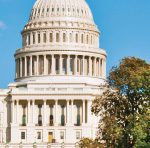The enactment of the Class Action Fairness Act ten years ago was designed to curb the widespread abuse of frivolous class action lawsuits, while preserving the rights of citizens to bring such actions. It also enabled those involved in lawsuits to transfer the case from the state courts to the federal courts. However, some contend … Continue reading “Class Action Abuse: Ten Years after CAFA”
With the advent of mobile delivery platforms, cloud-based technologies, and third-party vendors, businesses currently utilize the latest technology available to reach their customers and conduct sophisticated marketing campaigns. Yet, with their increased use of telemarketing, autodialer and text messages, there is a potential risk these businesses will be subjected to class action lawsuits under the … Continue reading “Consumer Protection, Telemarketing, and Litigation Trends”
July 21 marks the 5th anniversary of landmark legislation called the Dodd–Frank Wall Street Reform and Consumer Protection Act which brought about transformational change in the regulation of the financial services industry. The goal of the legislation was “to promote the financial stability of the United States by improving accountability and transparency in the financial … Continue reading “Fifth Anniversary of the Dodd-Frank Act”
Program Description: In March 2015 the CFPB released its final report to Congress on the use of arbitration agreements in disputes between consumers and providers of consumer financial products. The tone and conclusions of the report suggest that the CFPB intends to aggressively regulate arbitration agreements in consumer credit contracts. The CFPB could also implement … Continue reading “A Critique of the CFPB’s Arbitration Study”
The 2015 – 2016 Supreme Court term will address a variety of issues which may result in significant implications for the civil justice arena, specifically with regard to class actions, the issue of standing, and questions on state versus federal arbitration. This briefing covered five cases on the docket: In Campbell-Ewald v. Gomez, the Court will decide … Continue reading “Civil Justice Preview of the Supreme Court’s 2015-2016 Term”
Administrative agencies are increasingly using Administrative Law Judges and Administrative Judges to adjudicate, in the first instance, questions that arise out of their activities. The Securities and Exchange Commission recently came under scrutiny and curtailed use of these judges after analyses showed that the agency had a dramatically higher winning percentage before its own judges … Continue reading “Agencies and Administrative Law Judges: Use or Overuse?”
In February of last year President Obama directed the Department of Labor to update rules and requirements for retirement advisers and mandate that anyone who provides investment advice to a retirement plan, plan participant, or individual retirement account owner and is compensated by someone for doing so acts in the best interest of the client. … Continue reading “The Department of Labor’s Fiduciary Duty Rule”
The Food and Drug Administration approves the labels that contain the dangers of side effects and other contraindications for prescription drugs. Nevertheless, plaintiffs have successfully brought state-law based claims premised on the theory that these labels inadequately warned of some dangers of the drug. The below panel addressed whether and/or under what circumstances such state-law claims … Continue reading “Pharmaceuticals: FDA Approved Warning Labels and Pre-emption”
Volkswagen was recently alleged to have used software in its diesel vehicles to deceive emissions tests. In response, various plaintiffs have filed litigation concerning this issue, raising the question of how best to adjudicate the financial claims arising from this matter. This briefing asked: where large numbers of people are affected by the same conduct, … Continue reading “VW: Litigating a Corporate Crisis”
High-frequency trading, as documented in the best-selling Flash Boys: A Wall Street Revolt, has been the subject of several high profile legal settlements with major banks involved in “dark pools,” and other trading issues. Startup dark pool IEX—featured in Flash Boys—has filed a petition with the Securities and Exchange Commission to be recognized as a securities exchange. … Continue reading “IEX and High-Frequency Trading in the US Equity Market”


